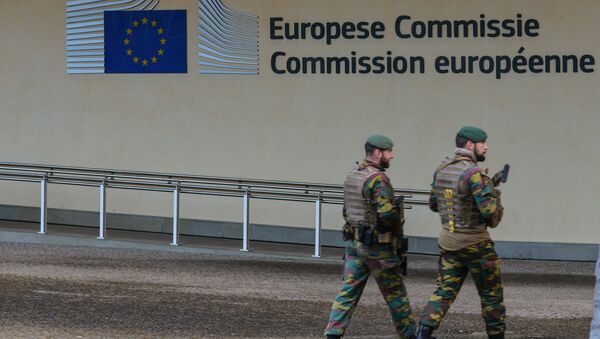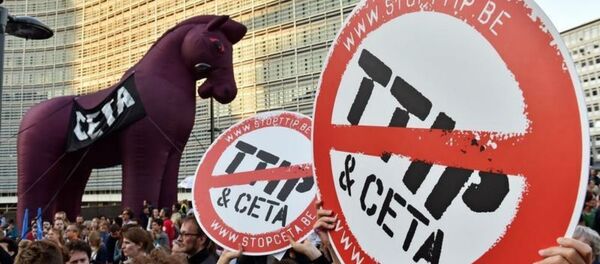The symptoms of the EU's "disease" were especially in place earlier in 2016, which saw Brexit, the temporary suspension of the EU-Canada trade agreement (CETA) by the Belgian region of Wallonia and the fizzling of the Transatlantic Trade and Investment Partnership (TTIP), a major EU major trade agreement with the US, according to Dobrov.
Also, he added, there are other reasons for internal disagreements, including the anti-Russian sanctions, opposed by a growing number of countries, including Italy, and the ongoing migrant crisis. The latter prompted the Czech Republic, Slovakia, Hungary and Poland to take a stand against Brussels and Berlin.
Bodrov also wrote of Poland, which openly ignores Brussels' so-called "European values" and adopts conservative laws.

In this vein, Foreign Minister Steinmeier warned of the threat of the collapse of the EU, which he said cannot cope with the accumulated problems, such as Brexit as well as the financial and migration crises.
"But there are other pressing issues, including those related to nationalism and the fact that more countries and political parties have started to slam the EU's policy." The EU crisis was also recently cited by German Chancellor Angela Merkel," Dobrov reported.
On the Comprehensive Economic and Trade Agreement (CETA), Dobrov quoted prominent German political scientist Jakob Augstein as saying that problems pertaining to the document's protracted signing represent a very bad sign for the EU.
According to Augstein, these problems revealedhow European citizens do not trust the lobbyists, politicians and experts who spent seven years to develop this agreement. Such secret games are completely rejected by the citizen, and they destroy the very idea of the EU.
"Erosion of the Western political system is obvious," Augstein said, citing numerous anti-European movements such as the "Alternative for Germany," as well as problems related to Brexit, Greece, migrants, and now Walloonia – "as if the European idea is losing itself, coming to a standstill."
He is echoed by Christoph Leitl, president of the Austrian Federal Economic Chamber, who believes that the latest scandal surrounding the CETA's signing revealed the EU's political impotence.
Leitl called for drawing lessons from this "disgraceful event" and start building what he described as the United States of Europe, Dobrov recalled referring to Leitl's proposal to strengthen the powers of the European Commission, making it a real European government. Such a structure will increase the EU's clout and help resolve the current differences between EU members, according to Leitl.
However, many experts believed that the implementation of such plans is currently unrealistic given ever-increasing nationalist and anti-European sentiments in the EU, something that they attribute to the EU's hasty eastward expansion, Dobrov said, referring to Poland as an example.
He recalled that although Warsaw receives huge sums from the EU structural funds, it even refuses to buy weapons from its European partners, preferring to cooperate with the United States.
Dobrov quoted experts as saying that in its current form, the EU remains an unfinished structure which cannot cope with its functions.
Seated by the Treaty of Rome of 1957, the EEC was a regional organization aimed to bring about economic integration among its member states.
Upon the formation of the European Union in 1993, the EEC was incorporated and renamed the European Community. In 2009 the EC's institutions were absorbed into the EU's wider framework and the community ceased to exist.







